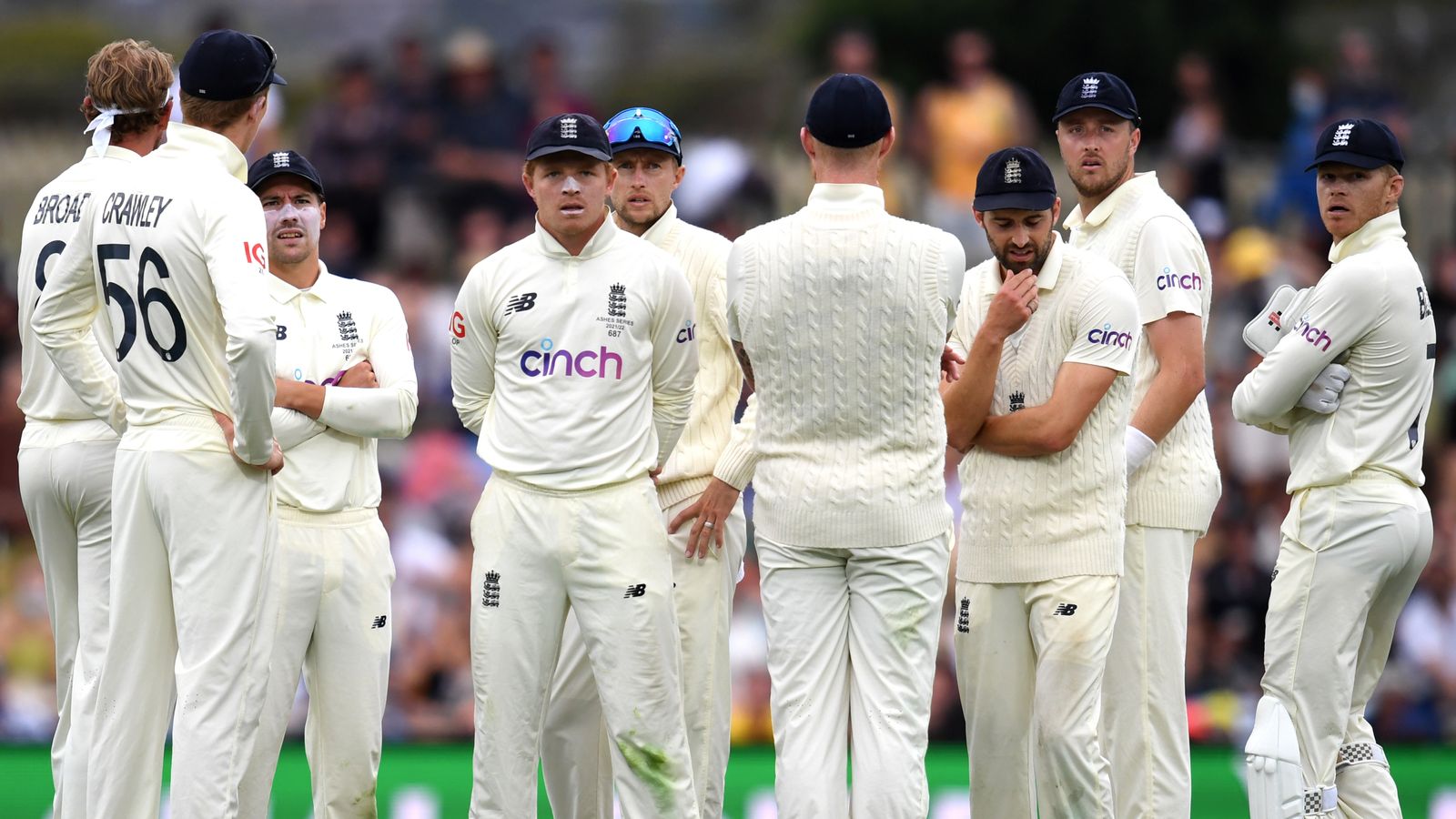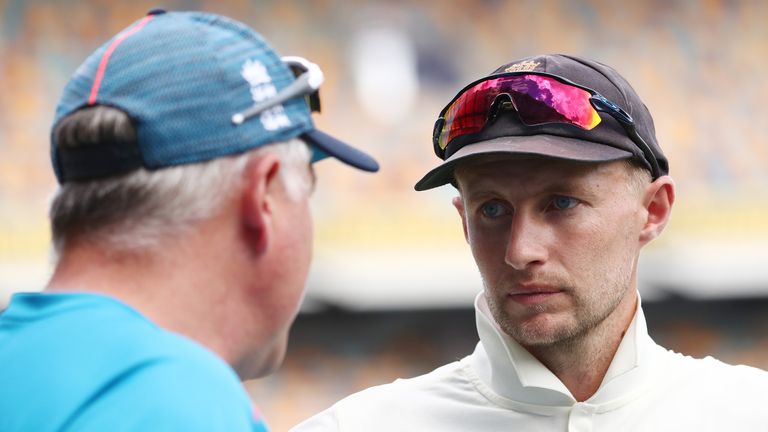County schedule, split coaches and end Ashes obsession – how do England fix their Test cricket? | Cricket News
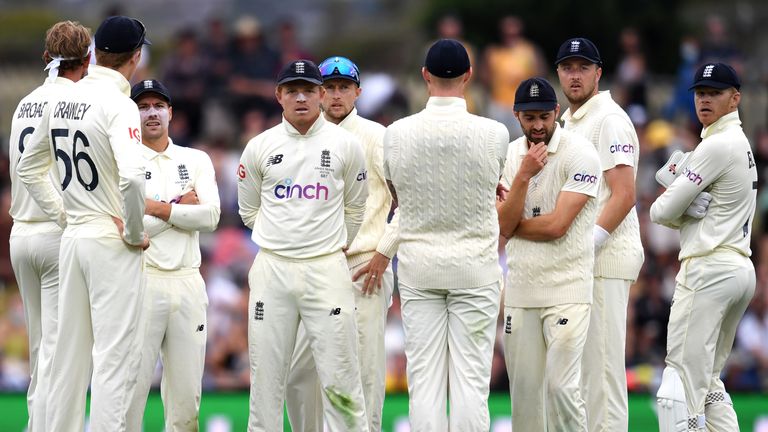
England suffered a 4-0 Ashes series defeat in Australia – how do they go about fixing their issues in Test cricket?
A thoroughly-dismal Ashes series for England came to an end in utterly-predictable circumstances in Hobart as their batting line-up disintegrated one last time.
Of course, heavy defeats in Australia are nothing new for England with 5-0 hammerings in 2006/07 and 2013/14 and another 4-0 reverse on their last tour, and yet the feeling persists that Joe Root’s side managed to plumb new depths with the manner in which they succumbed without so much as laying a glove on the hosts.
England have been an inconsistent side in Test cricket going back a number of years, always strong at home but struggling away, but series losses to New Zealand and India last summer showed that now, even in their own conditions, they find it difficult to compete with the world’s leading teams.
As so often seems to be the case, a thrashing down under appears to have been the final straw with ECB chief executive Tom Harrison talking of a “red-ball reset” after the series had been lost in Melbourne – but what might that entail? Sky Sports pundits Michael Atherton, Nasser Hussain and Rob Key looked at the areas that need addressing…
End the Ashes obsession
English cricket is fixated by The Ashes and as soon as one series is over, discussions begin over preparations for the next and, invariably, what can be done to ensure the team performs better as they try to regain the urn.
Series against Australia will always be the most important to the fans but while they are undoubtedly incredibly special for those involved in the England set-up, there are other big series in between and the preoccupation with The Ashes has led to a feeling that the here and now can often be overlooked.
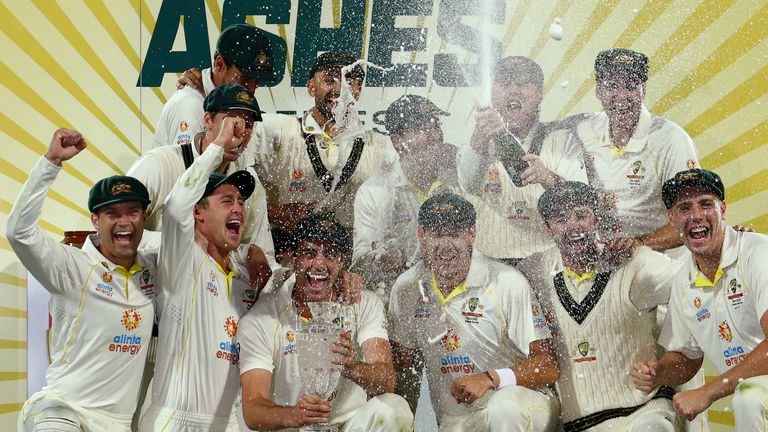
England’s Ashes obsession did nothing to stop Australia retaining the urn with ease
“The mindset for two years has been about how we’ve got to prepare for the Ashes, we’ve got to look to the Ashes, we’ve got to rest people for the Ashes, we’ve got to rotate for the Ashes, New Zealand and India are over, they’ll be good preparation for the Ashes,” Hussain told the Sky Sports Cricket Podcast.
“Then suddenly you’ve done all this prep and you turn up and the pitches are completely different to what you thought they would be. There were three green tops in there so your whole planning has gone out of the window. Just look down [at the pitch] in every Test match and try and win that Test match.”
Of course, that does not mean completely ignoring what is coming up but Key questions why that planning for the future seems to be so heavily focused on just one series.
Do England just want to beat Australia or do they want to be the best side in the world? And even if it is the former, then aiming for the latter is still the best way of doing so.
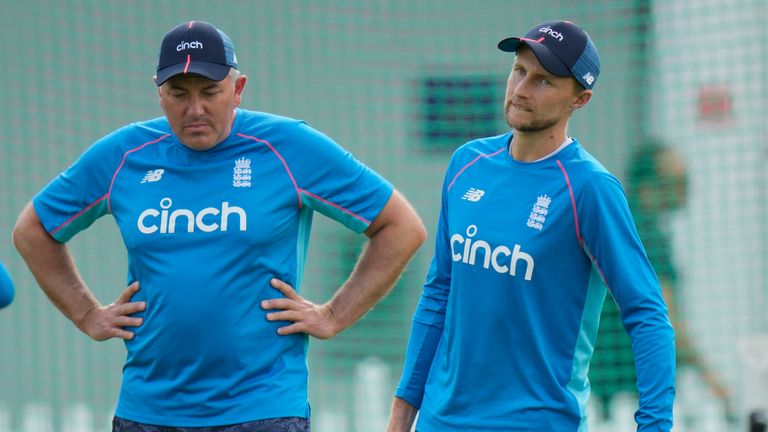
“When you make these mistakes, these clear cricketing mistakes and still don’t admit to making them, it shows that your brain is a little bit scrambled.”
Nasser Hussain on England’s management team
“There does have to be a degree of planning, but it doesn’t necessarily have to be about The Ashes,” Key said.
“What your planning has to be about is how do we become the best team in the world? That’s what Andy Flower did with Andrew Strauss. It wasn’t about getting everything ready for one Test match series.
“Duncan Fletcher the same really. When he saw Steve Harmison, he didn’t think ‘oh great, this is how we win The Ashes’, what he thought was ‘here’s a bloke, who if the penny drops for him in Test cricket, he can bowl 90mph rockets and could be a great bowler in Test cricket’.
“That’s your forward planning. It’s looking at your batsmen, like he did with Marcus Trescothick and Michael Vaughan, and it’s not about the Ashes, ‘they’re going to be good for the future, so we invest in those people’. Then when you’re looking at a pitch and picking a squad, you pick the best team for each game and each series. It’s not just about getting everything ready for The Ashes.”
Hussain added: “Before a ball went down in the series, I was hopeful we would get away from the narrative of we lose 4-0, 5-0, 4-1, Nasser Hussain loses his job, Andy Flower loses his job, Duncan Fletcher loses his job, Chris Silverwood loses his job because it just plays into the narrative that The Ashes is more important than every other sporting event there ever is and if you lose it, that means you have to go.
“But if you lose against New Zealand or India, or away to India, that doesn’t matter because we’re building towards The Ashes. I’m trying to get away from that.
“It’s West Indies next, win that game. Of course, you have someone thinking of the future but your mindset as a team, as a squad, has to be about that game. It has to be about winning every single Test match and let the future look after itself.”
Split coaches and the role of selector
There is a feeling that England will split with Silverwood once they have fully reviewed the Ashes debacle. The former Essex coach wants to stay but a run of 10 defeats in 14 Tests, albeit during a global pandemic and with player welfare, rest and rotation prioritised over results, has left him in a vulnerable spot, as has the fact that very few players, if any, have improved under his watch.
Atherton believes it is “impossible” for one man to coach England across all forms and has called for a return to separate red and white-ball coaches, something previously flirted with between 2012 and 2014 when Ashley Giles was in charge of the limited-overs side and Andy Flower the Test kingpin.
Due to a packed winter calendar, England are operating with that model anyway at the moment – Paul Collingwood is in charge for the T20s in West Indies which start just six days after the conclusion of the Ashes. It could have been four days had England batted properly in Hobart.
Atherton said: “I think England need to split the role of head coach. The Ashes came off the back of the T20 World Cup and you cannot tell me it is easy for one man to be across all this.
“With the schedule as it is, I think it is impossible for one man to do everything. With split coaches, you also broaden the talent pool and might get access to a number of people you fancy.”
Gary Kirsten, a front-runner to succeed Silverwood, has said he would only be interested in leading England’s Test team if someone else did the one-day role.
Key, meanwhile, says splitting the roles might get his “A1” pick in Ricky Ponting involved – not that he holds out too much hope of luring the former Australia captain and current Delhi Capitals coach.
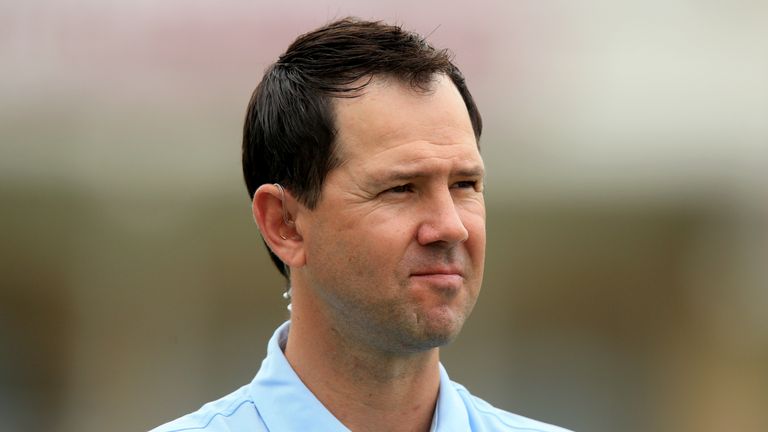
England would struggle to persuade Aussie legend Ricky Ponting to take over as head coach
Key said: “I would get someone like Ponting in for Test cricket – he would be the absolute A1 for me as I just love the way he talks about the game. He has such a good cricket brain and people follow him. Would he do it? Absolutely not. You’d probably have to give him five-million quid.
“I would then look hard for an English white-ball coach and the sad thing is that I cannot really give you a name. English coaches for England over recent years have been a disaster, with the same bloke (Peter Moores) doing it twice, so we have to look at that.”
The other issue regarding the coach is whether they should also be the chief selector, which Silverwood has been since Ed Smith left the ECB as part of a restructure last spring. It may be common in football for the coach to train the team and also pick it but less so in cricket.
Speaking to BT Sport over the weekend, Mark Butcher said it was “ludicrous” for England’s coach to also be their selector and, on the Sky Sports Cricket Podcast, Hussain explained the importance of having outside voices being involved in decisions, as he noted some of the bizarre calls during The Ashes.
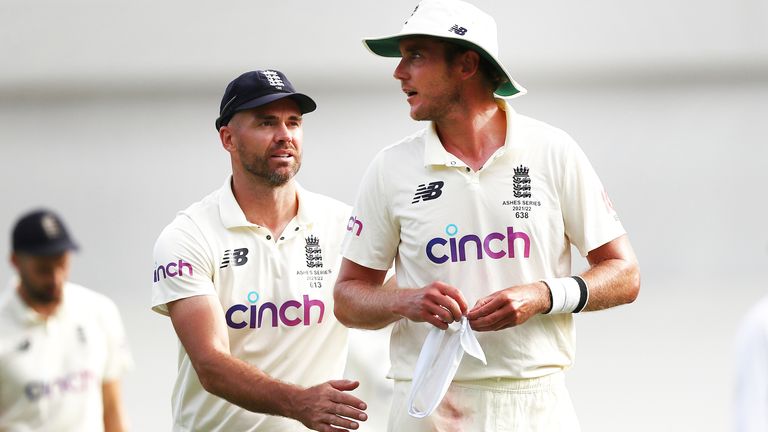
Stuart Broad and James Anderson were left out on a green top on Brisbane
Hussain said: “I think you do get in that bubble so much that you need an external voice to tap you on the shoulder when you are thinking of leaving out Stuart Broad and James Anderson on a green pitch in Brisbane or leaving out Mark Wood and Jack Leach on a flat one in Adelaide.
“When I was captain, I had (national selector) Geoff Miller. He would often ring me up and say ‘Nass, I have this lad for you. I think he can play – or I don’t think that lad can play’. I think England need to get away from everyone in the bubble making all the decisions.”
Strategy and decision making
Throughout the Ashes fiasco this winter, the decisions made by England at various junctures have left onlookers bewildered.
“Baffling” was Hussain’s verdict when it came to matters of selection, strategy and – for all the years planning for this series – lack of foresight in not sending the undercooked back-up batters in the main squad to play the solitary Lions match, meaning two such players, Jonny Bairstow and Zak Crawley, came in cold when they were drafted into the XI later in the series.
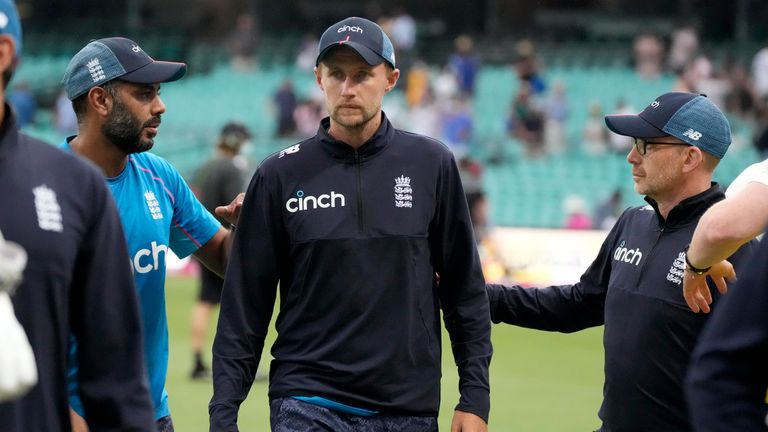
“You can’t hold Joe Root or Chris Silverwood accountable for the structure of English cricket. You hold them accountable for the team right in front of them. Are they making that team better? Are they galvanising that team? Is that team better than the sum of its parts? Anybody who has watched this series, you cannot say that and that’s what you have to hold them accountable for.”
Michael Atherton
That is just one such issue that has left captain, coach and director of cricket vulnerable ahead of the end-of-series review.
In the year leading up to the series, rest and rotation was the major talking point with Root often unable to go into games with his best team due to individuals being held back to ensure they were at peak physical and mental condition for The Ashes.
Yet when they got to Australia, it seemed to continue with fast bowler Mark Wood bizarrely “rested” for the second Test. England were promptly beaten on a good batting surface on which Wood’s pace would have been extremely useful and their hopes of winning back the urn were hanging by a thread.

Mark Wood was England’s leading wicket-taker in the series despite being left out in Adelaide
“This notion – and we heard it a lot from the England management at the start of the series – that The Ashes is a marathon not a sprint, well actually it was a sprint for two games because if you’re in the series after two games then you’ve a chance,” Atherton said.
“If you’re 2-0 down, no side in the history of English cricket has come back from 2-0 down in Australia. You had to throw everything at The Gabba and Adelaide and be in the series at that point. It was utterly baffling to me that Mark Wood was left out of that second Test match.
“It seems incredible to me because everyone has been talking about all the mistakes that have been made and yet there are a whole host of people who don’t think there should be any changes after this tour, that the captain should continue to be captain and the coach should continue to be coach and the director of cricket should continue to be director of cricket.
“You can’t list all those issues and say nobody is accountable. That was the whole point of Ashley Giles loading selection onto Chris Silverwood’s shoulders. He said, when he did that, ‘I want clear lines of responsibility and clear lines of accountability’. He’s got that and I’m afraid, after a tour like this, you have to be held accountable. There is no escaping it.”
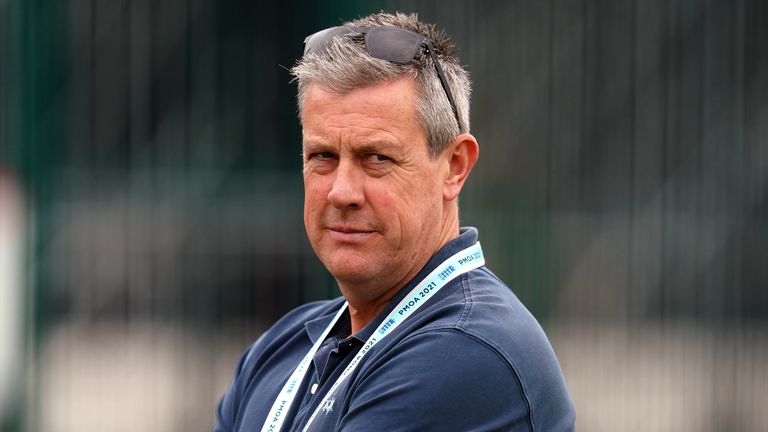
Hussain tells the Sky Sports Ashes Vodcast it is time for Ashley Giles to get tough with the England players in the wake of their 4-0 Ashes defeat to Australia
Hussain argued that those in charge need to be firmer with the players, saying: “In the end, you’re judged by results so someone needs to be tough with [the players]. Someone needs to be accountable.
“When Chris Silverwood, after those first two games, still says ‘I think we picked the right side’ – that is just nonsense. We need an honest appraisal of where we are as a red-ball cricketing side at the moment.
“Everything the players want, they seem to get. Has Ashley Giles done anything against the players? Is there anything else he’s said ‘no, you’re not doing that’ whether it be IPL or anything else? I think there needs to be a bit of toughness, a bit of ‘this is not good enough’.”
Key added: “Chris Silverwood has to be accountable for it because that is what Ashley Giles has set up, but I’d be willing to bet that Chris Silverwood hasn’t made a decision in the entire time he’s been there. But that is more fool him.”
County schedule and pitches
When the mild-mannered England Test captain voices his displeasure with the county set-up, you know you have got a problem. “Anyone coming into this Test team at the minute is doing it in spite of county cricket, not because of county cricket,” Root said at the conclusion of the Hobart Test.
With green pitches making low team scores par for the course and medium pacers dominating, Root questioned what “incentives” there were for players to open the batting, bowl spin, and bowl fast in county cricket, and asked how England were expected to compete with India in turning conditions or with 90mph Australia bowling with such little experience of those conditions back at home.
The County Championship has been pushed to the chilly margins of the season with white-ball cricket holding sway in the middle. Last year’s Bob Willis Trophy final, for example, stretched into October, finishing only shortly before Christmas adverts started being broadcast on the TV.
Atherton, Hussain and Key spoke earlier in the Ashes series about how county surfaces were having a detrimental effect to England’s Test prospects and both Atherton and Key explained on the latest podcast that they would shift the majority of red-ball cricket to between mid-May and mid-July. Key also wants a quality-over-quantity approach, reducing the season to 10-red ball matches plus a final.

Warwickshire won the 2021 County Championship and went on to win Bob Willis Trophy final – in October
The former Kent batter said: “We play more than enough red-ball cricket, we just don’t have the quality. I would take the best 12 teams from the country this year and put them in two top divisions. They play 10 games and the winners of those divisions then play to decide who wins the Championship.
“In the bottom division, if you finish in the top two, you replace the bottom sides in the top two divisions. In theory, it’s easier for the teams in the bottom to get into the top flight so they might look at it and say, ‘we don’t mind that’.
Key’s masterplan also includes staging red-ball matches during the section of summer dedicated to The Hundred – and for the profits from the 100-ball competition to filter down to the grassroots level and help increase the number of youngsters playing cricket.
Key added: “During The Hundred, I would have the best of the rest and any England players you need to play playing four or five-day cricket. If The Hundred makes money it should go back into county cricket and fund youth cricket. All county age-group cricket should be free. We talk about making cricket a game for everyone, how about we don’t price half of the people out of the market.”

“I think a lot of county cricketers will be reasonably happy at The Ashes ending the way it did. I think they will be thinking ‘thank goodness for this winter and the last year as finally you can listen to what is going on in county cricket and we can start doing something about it.'”
Nasser Hussain
Hussain added: “With the exception of Root, and (Ben) Stokes at times, do we have batters in red-ball cricket? No. I have seen a list of stats on England’s red-ball batters since 2014 and it was horrendous. I know some of it has been on spicy English pitches and some away from home but it was a horror show.
“Do we have a single spinner we can trust at the moment? No. Those are the areas we have to focus on and they are obviously linked. If the pitches you are playing on are all about seam, then your batters are getting no runs and your spinners aren’t bowling.
“Why do batters feel they have to reinvent the wheel with these new-fangled techniques? It must be because the ball is doing too much in county cricket. We have to look at when we are playing county cricket, the pitches we are playing on and the ball we are using.”
Getting the counties on side
The ECB may well be listening but how much power does it actually have to make the necessary changes? Plenty of the potential changes would require the approval of the 18 counties and Key is sceptical over whether they would accept any proposals that might impact their own income.
“Everyone is talking about we need a red-ball reset, no one is really living in reality in terms of what that means and how you do it,” he said.

Would counties ever be willing to agree to a system that meant only one short-format competition?
“We might say you only need one short-form competition but that is never going to get voted through. This is the problem. It is all well and good saying ‘we need to do this, this, this and this’ – these things are never going to get voted on by the county chairmen, CEOs and the ECB.
“That is the biggest problem and why we end up with this ridiculously jam-packed schedule because no one can agree, they can’t take away their self-interest.
“All the county chairmen and CEOs will be sitting there listening to this, going ‘yes, we absolutely need to sort out red-ball cricket and Test cricket – but, by the way, it better not impact on my county’. Everyone says we need to play less four-day cricket and make it better quality on better pitches, they all sit there and say, ‘good idea but it better not impact on us’.
Live Big Bash League
January 18, 2022, 8:00am
Live on
“I’ve seen it all before, we’ve been talking about less four-day cricket for years and years but counties will turn around and say, ‘we only get 50 days a year to make money, you’re not taking 12 of them away from us’.
“This is the biggest problem we have, the ECB don’t really have a huge amount of power in all this because they need 12 out of 18 counties to vote for that and they aren’t going to vote for anything if it isn’t on their agenda.”

